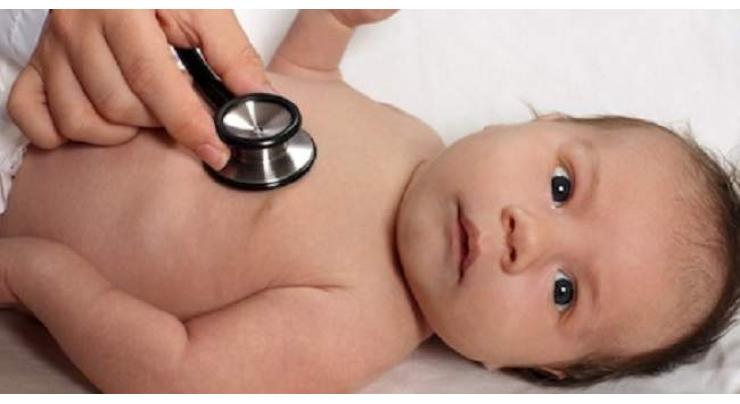
Mild ASD Cases Resolve With Growth Of Child: Cardiologist Suggests
Fakhir Rizvi Published February 20, 2018 | 08:20 PM

Atrial Septal Defect (ASD), a congenital child heart disorder, is an opening in the atrial septum and the opening in the atrial septum allows the blood from either side to mix, decreasing the efficiency of the heart's function.
HYDERABAD, (UrduPoint / Pakistan Point News - 20th Feb, 2018 ) :Atrial Septal Defect (ASD), a congenital child heart disorder, is an opening in the atrial septum and the opening in the atrial septum allows the blood from either side to mix, decreasing the efficiency of the heart's function.
Talking to APP here on Tuesday Director Interventional Cardiology Isra University Hospital Professor Dr. Muhammad Kashif Shaikh informed about the diagnosis of an Atrial Septal Defect (ASD) in a newborn or an older child should prompt consultation with a pediatric cardiologist.
Dr. Muhammad Kashif Shaikh said that most children with uncomplicated Atrial Septal Defects (ASD) are followed up by their Primary care provider and receive follow-up with a pediatric cardiologist every year or every other year.
He informed that children who require medical intervention or who have other co-morbidity are seen by a cardiologist more frequently. Dr. Muhammad Kashif said that in most children, ASD causes no symptoms and a very large defect may allow so much blood flow through it to cause congestive heart failure symptoms such as shortness of breath, easy fatigability or poor growth, but this is uncommon.
He said that most often an atrial septal defect is diagnosed when a physician hears a heart murmur during a physical examination. He further informed about the symptoms of atrial septal defect may not appear until adulthood despite the presence of the defect since birth and when symptoms do occur, they include difficulty in breathing, frequent respiratory infections and shortness of breath.
He informed that the Cardiologist may hear a heart murmur during a routine check-up but an accurate diagnosis, the cardiologist may carry out a physical exam, listen child's heart and lungs with a stethoscope and request a number of tests, depending on child's age, general health and child personal preferences.
About the treatment Dr. Shaikh informed that it depends on child's age, overall health, medical history, extent of the disease and parents personal opinion. Mild cases of ASD might resolve as child grows he said adding that in some children, an ASD may close on its own without treatment.
With a small atrial septal defect, the rate of spontaneous closure may be as high as 80 percent in the first 18 months of life, he further informed. He said that in other cases the opening is repaired if it does not close by the time child starts school.
It is preferable to treat ASDs during childhood to prevent complications later on in life, he added. Dr. Kashif further told that surgical repair if cardiac catheterization is not an option. The defect may be closed with stitches or a special tissue patch.
He said that the surgery is done under general anesthesia. While, the surgery is being performed, and child will be connected to a heart-lung machine, which will take over the heart's function temporarily, added. He suggested that child will have to visit the doctor for regular check-ups and take blood thinning medications to prevent blood clots and to aid the healing process.
Recent Stories

Tennis: ATP Barcelona Open results - 1st update

Swiatek's perfect 10 in Stuttgart as Vondrousova stuns Sabalenka

Arandu's roads closed due to flooding

Oil tanker catches fire in Islamabad’s Blue Area

Pakistan committed to ensure safety of foreign nationals: FO

Tennis: WTA Stuttgart results - 1st update

Four passengers injured as train hit an empty vehicle

Over- speeding bus crushed to death two bike riders

Turkey's Freedom Flotilla ready to set sail for Gaza

French teen dies from heart failure after knife attack near school

Iranians appear unfazed by Isfahan blasts

UAF celebrates Int'l Chinese Language Day
More Stories From Health
-

Rawalpindi woman gives birth to six babies
15 hours ago -

DC calls for intensive anti-polio drive in ICT
2 days ago -

World Hemophilia Day observed to underscore importance of providing comprehensive care
2 days ago -

Six in a family with heart on the 'right side'
2 days ago -

Diabetic disease increasing rapidly : Dr. Noor Elahi Memon
2 days ago -

World Hemophilia Day observed
3 days ago
-

ATC dismisses bail petition of doctor involved in illegal kidneys transplant
10 days ago -

Dr. Shehzad warns against deviation from WHO guidelines on anti-smoking
11 days ago -

Health activists express concerns over attempts to derail tobacco control
13 days ago -

UHS declares MBBS first prof, MS urology exam results
22 days ago -

Increased diagnostic testing for drug resistance
27 days ago -

IRD releases groundbreaking results of end TB programme
30 days ago











